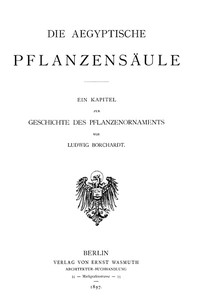Die Ägyptische Pflanzensäule by Ludwig Borchardt
"Die Ägyptische Pflanzensäule" by Ludwig Borchardt is a scientific publication written during the late 19th century. This work explores the history and significance of plant motifs in ancient Egyptian architecture, specifically focusing on various types of columns inspired by plants such as the Lotus and Papyrus. The detailed analysis includes discussions of botanical representations and their artistic interpretations in Egyptian art and architecture. The opening of the text presents a preface outlining
the manuscript's journey toward publication and the rationale for its creation. Borchardt expresses gratitude to colleagues who helped finalize the work after delays caused by his research trip to Egypt. He sets the stage for an in-depth examination of Egyptian plant columns, explaining his method of first describing the plants in a simple and naturalistic way, followed by an analysis of their artistic representations in historical artifacts before drawing connections to architectural forms. The beginning also introduces the structure of the book, which will cover various types of plant columns, such as the Nymphäensäulen (Lotus columns) and Papyrussäulen (Papyrus columns), highlighting the interplay between natural forms and architectural design in ancient Egypt. (This is an automatically generated summary.)
Read or download for free
| How to read | Url | Size | |||
|---|---|---|---|---|---|
| Read now! | https://www.gutenberg.org/ebooks/46014.html.images | 221 kB | |||
| EPUB3 (E-readers incl. Send-to-Kindle) | https://www.gutenberg.org/ebooks/46014.epub3.images | 3.0 MB | |||
| EPUB (older E-readers) | https://www.gutenberg.org/ebooks/46014.epub.images | 3.0 MB | |||
| EPUB (no images, older E-readers) | https://www.gutenberg.org/ebooks/46014.epub.noimages | 110 kB | |||
| Kindle | https://www.gutenberg.org/ebooks/46014.kf8.images | 3.1 MB | |||
| older Kindles | https://www.gutenberg.org/ebooks/46014.kindle.images | 3.0 MB | |||
| Plain Text UTF-8 | https://www.gutenberg.org/ebooks/46014.txt.utf-8 | 151 kB | |||
| Download HTML (zip) | https://www.gutenberg.org/cache/epub/46014/pg46014-h.zip | 2.7 MB | |||
| There may be more files related to this item. | |||||
About this eBook
| Author | Borchardt, Ludwig, 1863-1938 |
|---|---|
| Title | Die Ägyptische Pflanzensäule |
| Note | Reading ease score: 63.2 (8th & 9th grade). Neither easy nor difficult to read. |
| Credits |
Produced by Peter Becker and the Online Distributed Proofreading Team at http://www.pgdp.net |
| Language | German |
| LoC Class | NA: Fine Arts: Architecture |
| Subject | Columns -- Egypt |
| Subject | Architecture -- Egypt -- Details |
| Subject | Decoration and ornament -- Plant forms |
| Category | Text |
| EBook-No. | 46014 |
| Release Date | Jun 17, 2014 |
| Copyright Status | Public domain in the USA. |
| Downloads | 162 downloads in the last 30 days. |
| Project Gutenberg eBooks are always free! | |

